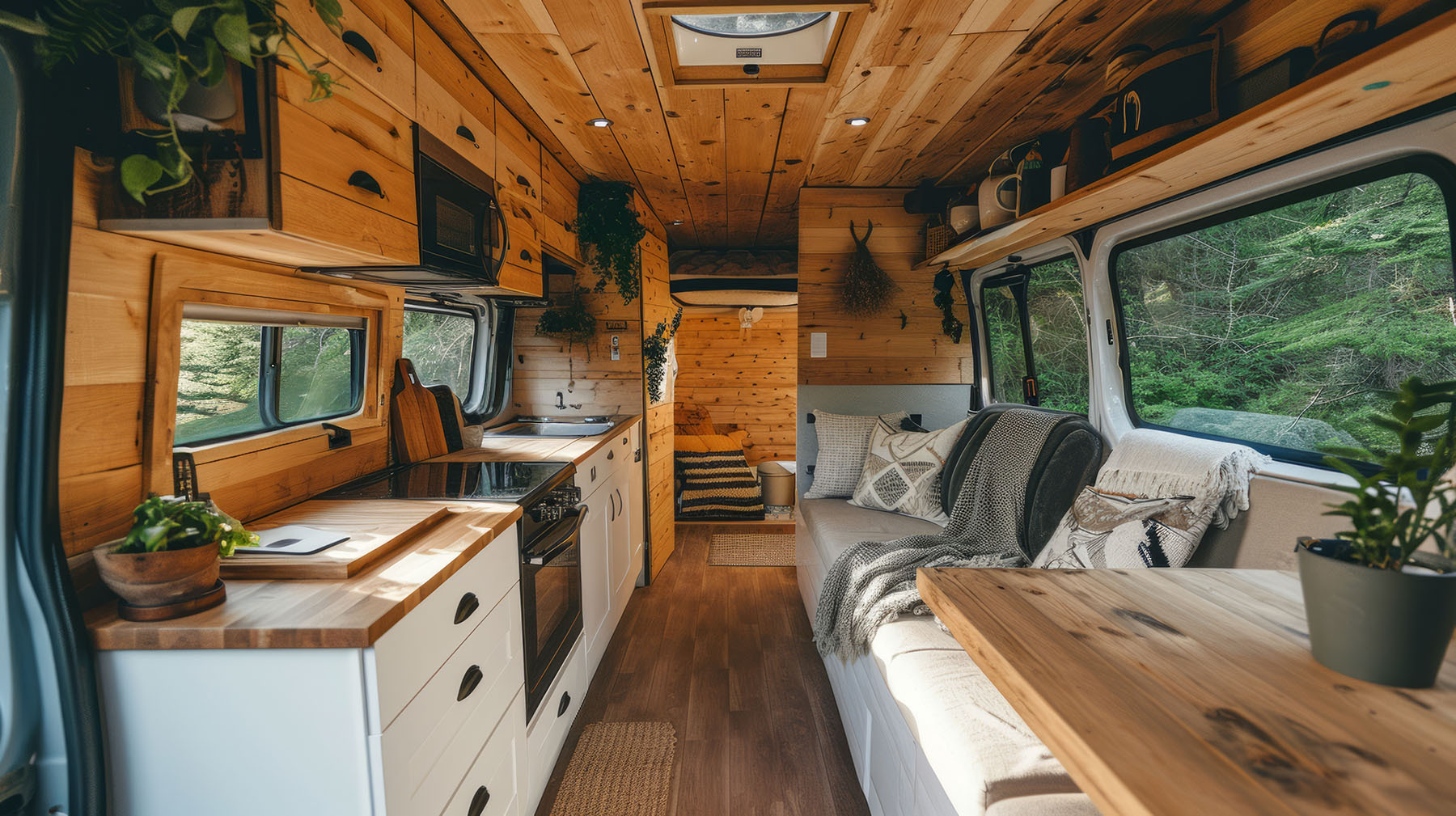Bus Conversion vs Standard RV: Which is Best for Buying Your First RV?
Posted by Happy Campers Store on Jun 4th 2025
Choosing the Right RV: Bus Conversions vs. Standard RVs
Choosing between a standard RV and a bus conversion depends on your lifestyle, budget, and DIY skills. Standard RVs offer convenience and warranties, while bus conversions allow full customization at potentially lower costs but require more effort.
Embarking on the journey of RV ownership is an exciting venture, offering the freedom to explore and the comfort of home on the road. However, with various options available, selecting the right type of RV can be daunting. This comprehensive guide delves into the intricacies of choosing between bus conversions and standard RVs, examining costs, maintenance, customization, travel lifestyle, and sustainability considerations to help you make an informed decision.
Understanding the Options
Standard RVs
Standard RVs are factory-built recreational vehicles designed for travel and living. They come in various classes:
- Class A: Large, bus-like vehicles offering spacious interiors, luxury amenities, and powerful engines designed for long-distance travel.
- Class B: Also known as camper vans, these are compact, easy to drive, and ideal for solo travelers or couples looking for efficient road trips.
- Class C: Built on a van or truck chassis, Class C RVs provide a balance between comfort and size, often including a bed over the cab for extra sleeping space.
Standard RVs typically come equipped with essential features such as a kitchen, bathroom, sleeping areas, and climate control systems. They are ideal for individuals or families who prefer ready-to-go convenience and minimal setup time.
Bus Conversions (Skoolies)

Bus conversions involve transforming retired buses—often school or transit buses—into custom mobile homes. This option appeals to DIY enthusiasts, minimalists, and those who value sustainability and uniqueness. The process includes gutting the interior, insulating the bus, installing plumbing and electrical systems, and crafting a personalized living space.
Some skoolie owners opt for luxury-style interiors with wood finishes, full-size kitchens, and solar power, while others stick with minimalist setups to reduce costs. The versatility of a bus conversion is unmatched, making it popular among adventure seekers and those embracing the tiny home lifestyle.
Cost Comparison
Initial Purchase
- Standard RVs: Entry-level Class C RVs can start around $50,000, mid-range Class A models run $100,000–$300,000, and high-end versions can exceed $500,000.
- Bus Conversions: A used school bus might cost $4,000–$20,000 depending on condition and mileage. Some enthusiasts have completed full conversions for under $20,000, while luxury builds may reach $80,000 or more.
Is it Cheaper to Buy an RV or Convert a Bus?
While a bus might have a lower initial cost, you need to factor in tools, materials, appliances, labor (if not DIY), and the time commitment. Conversely, RVs are turnkey but depreciate faster and can come with higher service costs.
Can I Buy an Already Converted Bus?
Yes, there’s a growing market for pre-converted skoolies on Craigslist, Facebook Marketplace, and Skoolie.net. Make sure to request build documentation and maintenance records before purchase.
Financing Options
RV dealerships often partner with lenders to offer financing options, while bus conversions can be trickier to finance due to their custom nature. Some personal loan providers like LightStream offer RV-specific loans. Improving your credit score can increase loan approval chances and reduce interest rates. Always compare rates and terms.
Customization and Comfort
Standard RVs
- Turnkey setups with plumbing, electricity, furniture, and appliances already installed.
- Warranties cover mechanical systems and appliances.
- Customization is limited to manufacturer options unless you’re willing to void warranties.
Bus Conversions
- Full freedom to design layout, materials, and systems.
- Popular upgrades include solar panels, composting toilets, reclaimed wood interiors, and smart tech integration.
- DIY resources like Instructables can guide your build.
Customization is where bus conversions shine. You can optimize space based on your lifestyle—whether it’s a large desk for remote work, pet-friendly setups, or off-grid living amenities like rainwater collection and energy storage.
Maintenance and Repairs
Maintenance is an important factor in total cost of ownership.
- Standard RVs: Expect to spend $1,000–$2,000/year on maintenance. Common expenses include roof sealing, plumbing repairs, and generator servicing.
- Bus Conversions: Buses often use commercial-grade parts that are cheaper to replace, but finding specialized service may be harder. Tire replacements (e.g., 22.5-inch tires) can cost $4,400 for a full set.
Refer to guides on RV Repair Club to stay ahead of wear-and-tear tasks.
Practical Considerations
Insurance and Registration
Standard RVs are easy to insure and register with VIN matching and industry support. Skoolies need to be reclassified as motorhomes and inspected by your state DMV. You may need to install specific amenities (e.g., fixed beds, kitchen) to qualify. Consult an RV insurance specialist familiar with conversions to ensure proper coverage.
Storage and Parking
Many neighborhoods have HOA rules restricting RV or large vehicle parking. Standard RVs often fit in RV parks, while buses may face limits due to non-standard designs. Urban storage can be expensive—consider self-storage lots with RV parking if space is limited at home.
Driving and Maneuverability
Class B and C RVs handle like large vans or trucks. Class A and buses require a learning curve. Practice turns, braking, and backing up before embarking on long trips. Consider installing backup cameras, tire pressure monitoring systems, and GPS navigation designed for RVs.
Environmental Impact
Converting a bus is inherently sustainable—reusing a vehicle that would otherwise go to waste. However, many older diesel engines emit more pollutants. Some bus owners retrofit with newer engines or switch to biodiesel. RV manufacturers are increasingly adopting sustainable materials and offering hybrid models to reduce environmental impact.
Lifestyle Considerations
Full-Time vs. Part-Time Living
Full-time RV living requires more storage, systems redundancy (e.g., solar + generator), and ergonomic comforts. You’ll need consistent internet for work, laundry solutions, and space for daily activities. Part-time users can opt for smaller or simpler setups without sacrificing comfort. Budgeting for fuel, campgrounds, and maintenance is essential in both cases.
Traveling with Pets
- Look for pet-friendly RV parks and plan routes around pet-accessible destinations.
- Secure pets with harnesses or crates during travel. Install pet ramps and ventilation fans to keep them comfortable.
- Bring medical records and a pet-specific first-aid kit. Some RVers dedicate pet-safe spaces for crates and supplies.
Community and Resources
Join social media groups and forums focused on van life, RV living, and skoolie conversions. Sites like The RVers and Reddit's r/skoolie community offer build tips, travel routes, and inspiration.
Real-Life Experiences
- Sarah & Tom: “Our bus reflects our lifestyle. We spent months on the conversion, and now it feels like a custom cabin on wheels.”
- Mike: “I chose a Class A RV. It came fully equipped, and I was on the road within days of purchasing it.”
- Lena: “I work remotely from my converted shuttle bus. The solar power system lets me stay off-grid for weeks.”
Future Trends
- Electric RVs and Conversions: As battery tech advances, expect longer range and more eco-friendly options.
- Smart Technology: Wi-Fi boosters, climate automation, and remote diagnostics are becoming standard.
- Sustainable Materials: Builders are using bamboo, recycled composites, and low-VOC paints to reduce environmental impact.
Keep an eye on trends via the RV Industry Association or brands like Winnebago and Thor Industries.
Conclusion
Choosing between a standard RV and a bus conversion comes down to your goals, budget, skills, and desired lifestyle. Standard RVs offer turnkey convenience, warranties, and widespread service support. Bus conversions offer unmatched customization, a unique aesthetic, and potential cost savings—especially for the handy or creative traveler. No matter which path you choose, understanding your options will set you up for an enjoyable and rewarding RV adventure.


